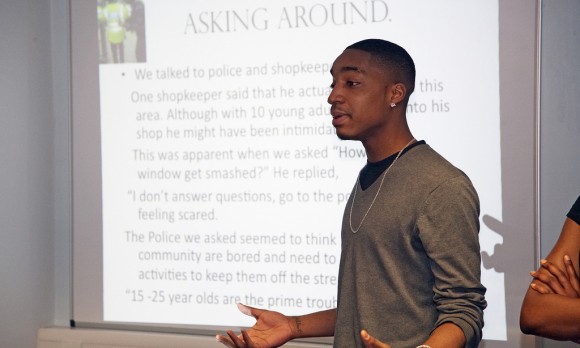Young Advisors
Young Advisors are a UK-wide community of young people shaping the future for today’s youth. Figen Gunes discovers how.
Young Advisors are an active youth-led community made up of 15-21 year olds across the UK whose purpose is to stimulate social action by showing community leaders and decisionmakers how to engage with young people. They ensure the thoughts and feelings of today’s youth are considered when policies are made that affect them.
Projects they have been commissioned to input into include investigating how young people in Waltham Forest in Essex are using emotional health services, how to reduce gang membership in Southwark, and producing a short film using a head cam to create a step-by-step guide on how to use sexual health services in Liverpool.
But who are the Young Advisors?
Working in 40 regional teams across the UK, 1500 young advisors work with local authorities, police, health and safety care groups and charities. They are paid around £8 an hour for their contribution to youth-oriented projects via government bodies.
Operating through a social enterprise model, youngsters retire from the job at the tender age of 22. Even the founder of this changemaking social enterprise Gary Buxton was the youngest CEO in the voluntary sector when he set it up back in 2007 at the age of 30.
“Being young today is different and more difficult. It is incredibly important to have a conversation to understand young people’s needs,” says Buxton. “Let’s say a decade ago, digital identity and digital bullying did not exist. Due to austerity, jobs are hard to come by. There is a higher rate of unemployment. The cost of education has gone up.”
Before they can join the training offered by the Young Advisors staff, young people are expected to go into their local communities and map out social problems. They are then encouraged to have a launch event to introduce their findings to local police, councillors and all other key decisionmakers to get feedback.
Young Advisors created the RoundUp website to show what the youth-led teams are doing by allowing Young Advisors and their groups to share their progress and work as they create change in their communities and services. The website grabs selected tweets, photos, videos and Facebook status updates from Facebook and Twitter and shares them all in one place to raise awareness about the work of the advisors. To exemplify the youngsters’ collective power, Mr Buxton tells us about a holiday rider scheme: “Public transport was a real barrier for young people in rural areas,” says Buxton. “They negotiated a holiday rider scheme with Stagecoach. That summer holiday in 2012 when the scheme came into force there was a 50 per cent increase in journeys made by youngsters. They saved £100,000 collectively.”
In the London area as many as 500 young advisors take part in decisionmaking processes in ten different boroughs. In Southwark, the team sits under the Community Safety Department of the council. The Southwark Young Advisors were approached by the Metropolitan Police and asked to develop a workshop that could be delivered by young people to police officers named ‘Breaking down the stereotypes and improving the experience’ in 2007. The team became the first young people in the UK to work in partnership with the police on stop and search and have delivered their workshop to over 900 Police officers.
There are 26 active members who are working in one of the main projects in Southwark team called Street Base, an on-street mentoring programme. Young people who are causing low-level anti-social behaviour are referred by police to the council to get the help of the Young Advisors team members. The peer-to-peer network aims to find out about the young persons’ interests in the area and refer them on to appropriate services, opportunities and apprenticeships. Their work also has contributed to a reduction in deliberate fire setting across the borough with particular seasonal reductions seen during October and November which historically suffered high numbers of fires. Deliberate fires over this period have reduced by 90 per cent between 2009 and 2013 from 41 to 4.
Councillor Richard Livingstone, cabinet member responsible for community safety at Southwark Council, said: “Since it began four years ago, Street Base has not only encouraged thousands of young people into these services but worked to turn around the public’s negative perception of young people in general.” Since 2009 the team has engaged with 9,019 young people and signposted 7,624 young people to youth centres.
One of the Young Advisors from Southwark, Zowie McIntosh, informs us about a new project due to start in the coming months. “We will be training adults about the slang used by my generation with the aim of reducing language barriers. Older people don’t understand the way we talk. Some words we say might not be offensive but they take offence,” she adds.















Write Your Comment